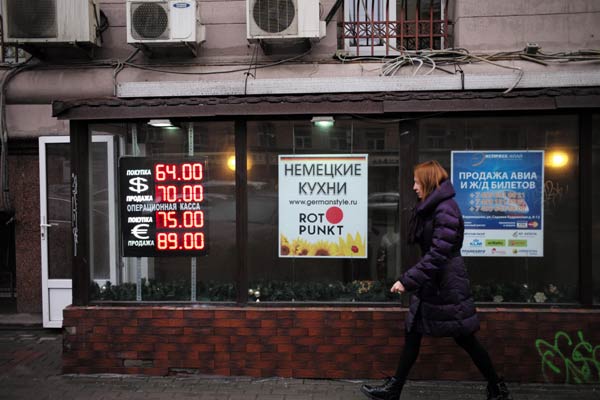 |
|
A woman?walks past boards showing currency exchange rates in Moscow, Dec 16, 2014.[Photo/Xinhua] |
Regulator urges Chinese exporters to hedge bets on forwards and swaps
The panic from Russia's beleaguered currency has not yet reached the Chinese foreign exchange market, but economists are warning about a chain reaction from economic turmoil in the nation's large neighbor.
Following the sharp drop in world oil prices, the rouble plunged about 20 percent against the dollar at one stage on Tuesday, sparking fears of a financial meltdown.

The Russian central bank announced a set of measures, including raising interest rates and selling gold, to stabilize the currency. After that the rouble firmed by nearly 9 percent against the dollar on Wednesday.
The dramatic collapse, however, reminded Chinese economists of the 1998 Russian financial crisis that destroyed global investors' confidence.
A spokesman for the Chinese Foreign Ministry, Qin Gang, told a regular news conference on Thursday that the China-Russia currency swap agreement has not yet been affected by the rouble's slide.
"We are confident in the Sino-Russian economic and trade cooperation outlook. The two countries' governments and enterprises are motivated to further improve bilateral trade and investments," said Qin.
Wang Yungui, head of policy and regulation for the State Administration of Foreign Exchange, said at a news conference on Thursday that China is closely monitoring the slide in the rouble.
As the depreciation of the rouble means a relative appreciation of the yuan, the SAFE official urged Chinese exporters to use financial tools such as forwards and swaps to hedge their risks.
"Russia has become a sizeable trading partner of China, so this by itself will hurt China's exports," said Louis Kuijs, chief economist in China at Royal Bank of Scotland Plc. "Other than that, the financial impact in China should be modest so far. Also, overall, the fall in the oil price is a net positive for China."
The oil price decline, rouble depreciation and financial turmoil in Russia, added to the impact of sanctions and the uncertainty that they create for businesses, are likely to create serious economic pain for Russia in 2015, he said.
China and Russia signed an agreement on a currency swap worth 150 billion yuan ($24.16 billion) in October.
Under the pact, however, if China holds the roubles, it will sustain a big loss, said Lian Ping, chief economist at Bank of Communications Co Ltd.
"This pushes the Chinese government to spend the roubles or use the currency for investment in order to hedge depreciation risk."
Dong Xiaojun, deputy chief of the economics department at the Chinese Academy of Governance, expressed concern that a further slump of the rouble may hurt the economy in China.
"The currency crisis in Russia may lead to a debt crisis if market panic spreads, which will be a big risk for the fragile global recovery and for other emerging countries," she said.
Dong said that the US Federal Reserve Board may start a cycle of interest rate hikes in mid-2015, so the market is likely to expect further rouble depreciation.
"The Chinese central bank should maintain a stable exchange rate against the dollar so as to prevent massive capital outflows and stabilize the financial market," said Dong.
Chi Jun contributed to this story.
